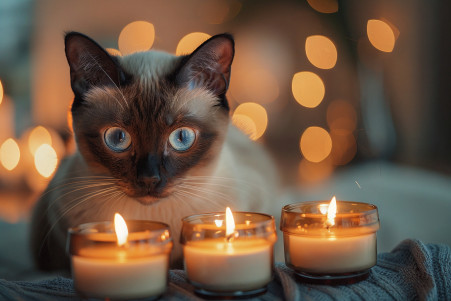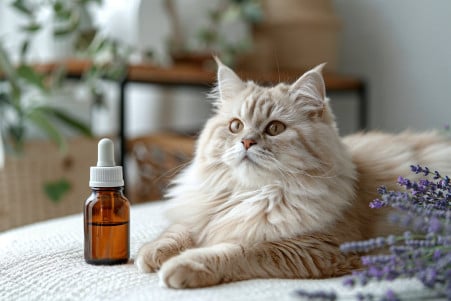Can You Burn Incense Around Cats? The Risks and Precautions
16 February 2024 • Updated 14 February 2024

Incense is often used to create a relaxing environment, but it may not be safe for your furry friends. The smoke and fragrances released by incense can be harmful to cats, especially if they have pre-existing respiratory problems. To avoid any potential issues, it is best to burn incense in a well-ventilated area that is separate from your pets or to consider other options.
This article will use information from veterinarians and air quality research to discuss the potential risks of burning incense around cats. By looking at studies in the fields of toxicology, animal health, and indoor environmental science, we will be able to determine how incense smoke and its components can impact cats. This in-depth look will help cat owners better understand how to create a relaxing home environment that is also safe for their cats.
Can you burn incense around cats?
The Dangers of Incense Smoke: How Incense Can Poison Your Cat
Incense smoke is a complex mixture of particulate matter and a wide variety of gases and organic compounds, many of which are toxic to cats. A study posted on PubMed shows that exposure to incense smoke causes systemic oxidative stress, inflammation, and endothelial dysfunction in mammals, which could be harmful to cats.
The study shows an increase in malondialdehyde, a decrease in antioxidants like superoxide dismutase and reduced glutathione, and an imbalance in vascular function markers, including nitric oxide and endothelin-1.
A study in the Journal of Inflammation Research shows that incense smoke contains a number of toxic gases, including carbon monoxide, and volatile organic compounds such as benzene and polycyclic aromatic hydrocarbons. These compounds are associated with respiratory problems and even carcinogenic effects in both humans and animals. In addition, the study shows that removing cats from environments with incense smoke can lead to a significant improvement in these health markers.
It’s important for cat owners to know about the toxicology of incense smoke so that they can avoid unnecessary exposure and protect their cats from harm. Given the potential for severe systemic and respiratory effects, it’s important to think about the impact of indoor air pollution on our feline friends.
Up in Smoke: The Respiratory Dangers of Incense Smoke for Cats
Cats are not just small people, but because of their unique physiology, they are especially susceptible to the dangers of smoke inhalation. VCA Animal Hospitals notes that the inhalation injuries that pets suffer from smoke exposure can be caused by a number of toxic components in smoke, including carbon monoxide, hydrogen cyanide, and chemical irritants.
These can lead to inflammation, impair oxygenation, and even cause thermal injury to the sensitive tissues of a cat’s respiratory tract.
Clinical signs of smoke-related respiratory distress in cats include coughing, wheezing, and difficulty breathing. In addition, cats may experience neurological signs like weakness or seizures as a result of carbon monoxide poisoning, which can lead to a distinctive cherry red coloration of the gums. Irritation of the eyes and visible facial or muzzle burns are other signs that may be seen.
A guarded prognosis for recovery often necessitates intensive veterinary care, including oxygen therapy, intravenous fluids, and medications to manage inflammation and prevent secondary infections. As a result, it’s important for cat owners to watch their pets closely for any signs of respiratory distress when incense is being burned, and to put their cats’ health above their own enjoyment of the aroma.
Smelling Trouble: The Impact of Odor on Cat Behavior
Cats have a well-developed sense of smell, which makes them highly sensitive to odors, especially strong ones that can cause stress. Studies published in PMC have found that this sensitivity can lead to stress-related behaviors due to a loss of predictability in their environment, especially when it comes to changes in the odors in their home. Stress-related behaviors in cats, such as hiding, inactivity, and aggression, are often caused by strong odors, like incense.
Studies published in ScienceDirect have found that domestic cats use the Secure Base Effect (SBE) to help them cope with stress, which means they use their owner’s presence or scent as a familiar stimulus.
However, studies have found that the use of an item with the owner’s scent alone does not reduce stress-related behaviors, which suggests that the emotional aspects of odors are involved in a cat’s response to them in a more complex way.
In addition, studies published in the Journal of Feline Medicine and Surgery have shown how professionals have used pheromone therapy to change stress and behavior in cats, which demonstrates the complex impact of odors on a cat’s sense of security and social interactions.
This means that while some specific olfactory interventions can help cats that are stressed, the general use of strong odors, like incense, can be disruptive and even lead to behavior problems. Cat owners should be aware of their cat’s sense of smell and choose odor solutions that help, rather than disrupt, their feline friends.
Cat-Safe Alternatives to Incense
If you’re a cat owner who wants to keep your home smelling fresh but doesn’t want to put your pet’s health at risk, there are a few alternatives to incense that are safe for cats.
One option is to use an air freshener that’s specifically designed to be safe for pets, like Febreze. Febreze is made to eliminate pet odors and is safe for cats.
Another option is to use a pet-safe candle, which can help you create a relaxing atmosphere without the risks associated with inhaling smoke. Regular cleaning, especially of your cat’s litter box, is also a great way to keep your home smelling fresh.
Air purifiers are another way to keep your home smelling fresh while also improving your indoor air quality and reducing your reliance on scented products. For this reason, they’re a great option for anyone who wants to keep their home smelling fresh without using incense.
Some air purifiers are even designed to help you manage pet odors, like the Blueair Blue Pure, which was recommended by The Dodo. Air purifiers work by removing particulate matter from the air, which is especially helpful for cat owners who are worried about respiratory irritants.
While essential oils are often used as an alternative to incense, cat owners need to be careful when using them. According to the Pet Poison Helpline, cats are especially sensitive to essential oils because their livers can’t metabolize them as quickly as other animals’ livers, which means they can build up and become toxic.
By choosing safe alternatives and being aware of the risks, cat owners can create a safe, pleasant environment for their pets.
Essential Oils and Cats: The Bottom Line
When it comes to the health of your cat, it’s important to be careful when using essential oils. According to VCA Animal Hospitals, many essential oils are toxic to cats because they don’t have the liver enzymes necessary to break down and eliminate certain chemical compounds, which can lead to a buildup in their bodies.
Oils that are toxic to cats include cinnamon, citrus, peppermint, pine, sweet birch, tea tree, wintergreen, and ylang ylang. Exposure to these oils can result in symptoms such as difficulty walking and breathing, drooling, lethargy, and muscle tremors.
In addition, PetMD warns against the use of diffusers, which release essential oils into the air in an aerosolized form. Even reed diffusers can be problematic because they can change the chemical composition of the oils and cause respiratory irritation when inhaled. To protect your cat, it’s important to use essential oils and diffusers carefully and make sure your cat isn’t exposed to the oils in the air.
If you think your cat has been exposed to essential oils and is showing signs of poisoning, it’s important to get them to a veterinarian right away. The Pet Poison Helpline recommends taking steps to prevent exposure by keeping essential oils out of your cat’s reach, not using them in areas where your cat spends time, and talking to your vet before using any scented products in your home.
Final Thoughts: Creating a Safe Scent-scape for Your Cat
As we’ve discussed, incense and some essential oils pose real dangers to our cats’ health and well-being. The chemistry of incense smoke, which includes particulate matter and a variety of toxic gases, can cause oxidative stress and respiratory problems.
Strong smells can also overwhelm a cat’s highly sensitive sense of smell, leading to behavioral issues. In light of this research, it’s important for cat owners to be aware of the potential health and behavioral impacts of these aromatic practices on their pets.
Thankfully, there are safer ways to create a pleasant, cat-friendly scent-scape in your home. Air purifiers, pet-safe odor eliminators, and pet-safe candles are all good options that can help you minimize risk and keep your cat safe.
It’s important for cat owners to talk to their vets about their individual fragrance needs. Finding a balance between creating a pleasant home environment and keeping your pets safe doesn’t have to be difficult—with the right information and support, you can create a home that’s safe and comfortable for both you and your cats.


